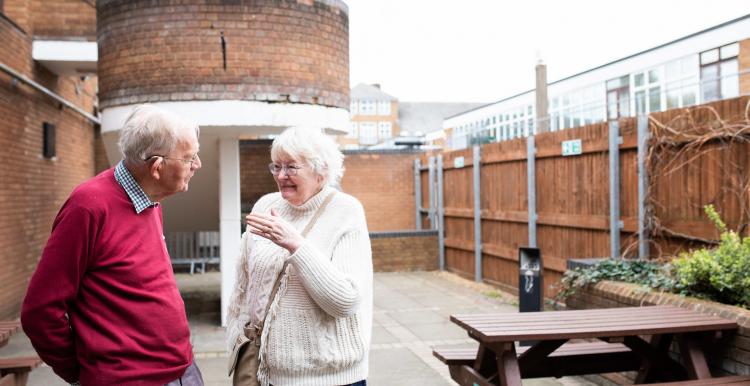Your views helped improve non-emergency patient transport services

Find out more about Rutland's Non emergency patient transport service
The Non-Emergency Patient Transport Service (NEPTS) in Leicester, Leicestershire and Rutland is provided by TASL. This service provides non-emergency transport to and from medical appointments for patients who have a medical condition that would prevent travel by other means.
Background
While for most people, journeys to and from healthcare appointments are something they can manage on their own, some need additional support. These people are often older, disabled or living with a long-term condition.
In partnership with Age UK and Kidney Care UK, we published a joint report in 2019 called "There and back". It looked at the experiences of over 3,000 people who shared the challenges they faced when travelling to and from NHS services, including issues with public transport, parking, and NEPTS.
Thanks to your feedback, we were able to share with NHS England how patient transport services worked for you.
Vague eligibility criteria
The main issue people reported was the impact of vague eligibility criteria and how these were applied differently across the country. The lack of consistency has left patients and families unclear about whether they could receive travel support, leading to access inequalities, confusion, and deteriorating health conditions.
People who are denied patient transport can appeal. However, because the eligibility criteria are so vague, original decisions to deny someone transport are frequently overturned. This is a waste of people's time and NHS resources, and places unnecessary stress on those already coping with health conditions.
NHS England Review
At the 2019 Healthwatch National Conference, former NHS England Chief Executive Sir Simon Stevens announced a formal review of Non Emergency Patient Transport Services.
We shared your experiences of patient transport at every stage of the review.
NHS England has now published their end of review report, announcing:
-
Integrated Care Systems (ICS) will now assume responsibility for NEPTS
-
The development of a new national framework for NEPTS
-
Information on a public consultation for updated national eligibility criteria, including support for all patients travelling to and from renal dialysis appointments
-
Improved use of technology to enhance coordination of appointments and communication to patients waiting for journeys
-
A commitment to more comprehensive transport support for those with needs outside of NEPTS eligibility
-
Support for providers to publish reports on services every six months to increase transparency
-
Improved procurement and contracting to help with the commissioning of improved services
-
A commitment to 100% zero emissions journeys by 2035.
What do the changes mean for you?
New eligibility criteria
Alongside this report, there are proposals for new, clear, and consistent eligibility criteria. These aim to:
-
Clarify eligibility for those with a medical, mobility, safeguarding, cognitive or sensory need
-
Introduce a new universal commitment to transport support for all journeys to and from renal dialysis
-
Provide more clarity and transparency about transport to and from appointments for everyone, regardless of eligibility to NEPTS.
NEPTS is only available for a journey to a hospital for treatment or a diagnostic appointment. For support getting to and from GP practice, your local pharmacy or your dentist, please speak to your GP.
Access to Healthcare Travel Cost Scheme
The review also commits to making improvements in accessing the Healthcare Travel Cost Scheme. This scheme is available for those who are not eligible for support from patient transport but qualify instead for financial support to get to and from their appointments.
Changes to the scheme include a commitment to reimburse claims within days (and ensure nobody ever waits more than 30 days) compared to 90 days under the current system.
The Healthcare Travel Cost Scheme is available to:
- Those living permanently in a residential care home, or where the local authority pays towards the cost of the accommodation
- Children in local authority care, asylum seekers and their families, where they receive government support
Those in receipt of the following benefits (and their children):
- Universal Credit up to certain income limits
- Income support
- Income-based Job Seekers Allowance
- Income-based Employment and Support Allowance
- Working tax credit and child tax credit
- Pension Credit
Healthwatch, Age UK and Kidney Care UK are welcoming the review
Imelda Redmond CBE, national director of Healthwatch England said:
"People requiring non-emergency hospital transport are often older, disabled or living with a long-term condition, such as patients needing renal dialysis. These services are vital in ensuring they don't miss appointments or that transport issues don’t exacerbate the physical and emotional stress of travelling and receiving medical treatment.
"We look forward to supporting NHSE in implementing the changes and ensuring they work for everyone who relies on hospital transport.”
Fiona Loud, Policy Director of Kidney Care UK, said:
“We are delighted to welcome the universal transport commitment for all of the 21,000 kidney patients on dialysis, who receive their treatment in hospitals or satellite units. With the need to attend dialysis three times a week, transport to and from dialysis is a key part of kidney healthcare and one which has a significant impact on patients’ income and quality of life.
"These new proposals show a real determination to improve patient care. National standards, including waiting times, will be monitored and published, providing a real opportunity to improve the day-to-day experience for people who have to make over 300 journeys a year to get to and from their life-maintaining treatments.”
Caroline Abrahams, Charity Director at Age UK, added:
“Non-emergency patient transport has been something of a Cinderella service for far too long, because when it works well it can make the world of difference to an older person who may otherwise find it unbelievably stressful and tiring accessing hospital services when they need them. It's great that NHSE is committing to review the criteria which determine entitlement to hospital transport, and to improving the overall quality of the service too. The proof of the pudding will be in the eating, but we really do hope that the outcomes of this review will make an appreciable difference to many older people, up and down the land."
"We would also like to thank NHSE for sticking with the review and seeing it through to a successful conclusion, when they have had so much else to focus on over the last fifteen months. "
Tell us how new services are working
The report marks the end of a review which began because NHS England heard your experiences of patient transport. But is also the beginning of an implementation period for commissioners, providers, the wider system – and of course you – patients, social care service users, and carers.
It will now be crucial to ensure that these changes improve services for the public. To continue representing your views we want to hear how new services are working for you. Your voice will be particularly valuable during the current consultation on new eligibility criteria.
Respond to the consultation by Monday 25 October to have your say on the new eligibility criteria.
